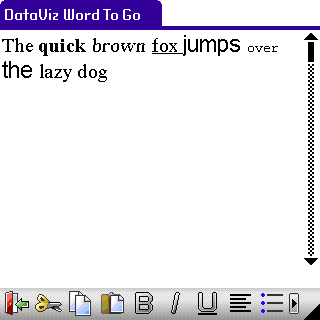
Microsoft Excel is a spreadsheet developed by Microsoft for Windows, macOS, Android and iOS. It features calculation, graphing tools, pivot tables, and a macro programming language called Visual Basic for Applications (VBA). It has been a very widely applied spreadsheet for these platforms, especially since version 5 in 1993, and it has replaced Lotus 1-2-3 as the industry standard for spreadsheets. Excel forms part of the Microsoft Office suite of software.
A spreadsheet is a computer application for organization, analysis, and storage of data in tabular form. Spreadsheets were developed as computerized analogs of paper accounting worksheets. The program operates on data entered in cells of a table. Each cell may contain either numeric or text data, or the results of formulas that automatically calculate and display a value based on the contents of other cells. A spreadsheet may also refer to one such electronic document.
In computing, serialization or serialisation is the process of translating a data structure or object state into a format that can be stored or transmitted and reconstructed later. When the resulting series of bits is reread according to the serialization format, it can be used to create a semantically identical clone of the original object. For many complex objects, such as those that make extensive use of references, this process is not straightforward. Serialization of object-oriented objects does not include any of their associated methods with which they were previously linked.
Apache POI, a project run by the Apache Software Foundation, and previously a sub-project of the Jakarta Project, provides pure Java libraries for reading and writing files in Microsoft Office formats, such as Word, PowerPoint and Excel.
Flexible Image Transport System (FITS) is an open standard defining a digital file format useful for storage, transmission and processing of data: formatted as multi-dimensional arrays, or tables. FITS is the most commonly used digital file format in astronomy. The FITS standard was designed specifically for astronomical data, and includes provisions such as describing photometric and spatial calibration information, together with image origin metadata.
A comma-separated values (CSV) file is a delimited text file that uses a comma to separate values. Each line of the file is a data record. Each record consists of one or more fields, separated by commas. The use of the comma as a field separator is the source of the name for this file format. A CSV file typically stores tabular data in plain text, in which case each line will have the same number of fields.
In computing, a Personal Storage Table (.pst) is an open proprietary file format used to store copies of messages, calendar events, and other items within Microsoft software such as Microsoft Exchange Client, Windows Messaging, and Microsoft Outlook. The open format is controlled by Microsoft who provide free specifications and free irrevocable technology licensing.
Computer-assisted audit tool (CAATs) or computer-assisted audit tools and techniques (CAATs) is a growing field within the IT audit profession. CAATs is the practice of using computers to automate the IT audit processes. CAATs normally includes using basic office productivity software such as spreadsheet, word processors and text editing programs and more advanced software packages involving use statistical analysis and business intelligence tools. But also more dedicated specialized software are available.

Documents To Go is BlackBerry's cross-platform office suite for Palm OS, Windows Mobile, Maemo, BlackBerry OS, Symbian, Android, and iOS. Also, a larger-screen version would have been included with the Palm Foleo, but Palm, Inc. cancelled the device before its release. The desktop tool, which provides document synchronization between one's handheld device and one's computer, is available for both Microsoft Windows and Mac OS X. On 8 September 2010, it was announced that DataViz had sold the program along with other business assets to Research In Motion for $50 million.
A pivot table is a table of statistics that summarizes the data of a more extensive table. This summary might include sums, averages, or other statistics, which the pivot table groups together in a meaningful way.
Symbolic Link (SYLK) is a Microsoft file format typically used to exchange data between applications, specifically spreadsheets. SYLK files conventionally have a .slk suffix. Composed of only displayable ANSI characters, it can be easily created and processed by other applications, such as databases.
Data exchange is the process of taking data structured under a source schema and transforming it into a target schema, so that the target data is an accurate representation of the source data. Data exchange allows data to be shared between different computer programs.
A file format is a standard way that information is encoded for storage in a computer file. It specifies how bits are used to encode information in a digital storage medium. File formats may be either proprietary or free and may be either unpublished or open.

ActiveReports is a .NET reporting tool used by developers of .NET Core, MVC, JavaScript, WinForms, and ASP.NET applications. It was originally developed by Data Dynamics, which was then acquired by GrapeCity. ActiveReports is a set of components and tools that facilitates the production of reports to display data in documents and web-based formats. It is written in managed C# code and allows Visual Studio programmers to leverage their knowledge of C# or Visual Basic.NET when programming with ActiveReports.

This article refers to the last FarPoint Edition of the Spread Product line. Spread is now developed by GrapeCity, Inc. Since the acquisition, Spread for Biztalk Server has been removed from the product line and SpreadJS, a JavaScript version, has been added.

Google Contacts is Google's contact management tool that is available in its free email service Gmail, as a standalone service, and as a part of Google's business-oriented suite of web apps Google Workspace.

Google Fusion Tables was a web service provided by Google for data management. Fusion tables can be used for gathering, visualising and sharing data tables. Data are stored in multiple tables that Internet users can view and download.

OpenRefine, formerly called Google Refine and before that Freebase Gridworks, is a standalone open source desktop application for data cleanup and transformation to other formats, the activity known as data wrangling. It is similar to spreadsheet applications ; however, it behaves more like a database.
Machine-readable data, or computer-readable data, is data in a format that can be processed by a computer. Machine-readable data must be structured data.
Data scraping is a technique in which a computer program extracts data from human-readable output coming from another program.





